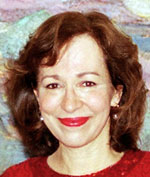|
|
|
My life is not
this steeply sloping hour in which you see me hurrying."
- Rainer Maria Rilke |
An Invitation to Learn
Mindfulness-Based Stress Reduction |
| |

Photo by Barbara Carr
| |
| |
Learn to live with greater vitality, health and well-being at an
eight-session Mindfulness-Based Stress Reduction program. Presented by
the Mindfulness-Based Stress Reduction Center of New Jersey, the program
offers powerful methods for reducing stress in your everyday life.
Diane Handlin, Ph.D. is the only instructor in New Jersey and one of the few in the world (not just trained) but actually Certified by Jon Kabat-Zinn's and Saki Santorelli's Center for Mindfulness at UMass Medical School.
|
|
To commit oneself to too many projects, to want to help everyone in everything is to succumb to the violence of modern times.
- Thomas Merton
Shake out your qualms. Shake up your dreams.
Deepen your roots. Extend your branches. Trust deep water
and head for the open.
James Broughton
|
|
Upcoming Events
Free Introductory Talk
Wednesday, November 14, 2012
7:30-9:00 pm
Temple Sinai, 208 Summit Ave, Summit NJ
All are Welcome
Reservations are required.
January 2013 Course in Summit NJ
For more information or to reserve a place for course, please contact Dr. Diane Handlin at 732-549-9100 or diane@drdianehandlin.com
For more information go to www.mindfulnessnj.com
(Please note that MBSR is an educational course
and not psychotherapy. If you suspect that you have medical or
psychological issues, please pursue appropriate treatment.) |
|
Worthy of Note
11th Annual International Scientific Conference
Investigating and Integrating Mindfulness in Medicine, Health Care, and Society
with Jon Kabat-Zinn, Saki Santorelli
and the top researchers in the field
April 17 - 21, 2013
at the Four Points by Sheraton, Norwood MA
www.umassmed.edu/cfm/conference
Videos with Jon Kabat-Zinn
Jon Kabat-Zinn discusses MBSR and the stress of modern life, YouTube.
Jon Kabat-Zinn discusses the significance of MBSR for leading a healthy life,
Google talk, YouTube, Oct 11, 2007.
Jon Kabat-Zinn discusses the scientific research on MBSR and its relationship to health,
Google talk, YouTube, March 8, 2007.
Jon Kabat-Zinn's most recent book Mindfulness for Beginners: Reclaiming the Present Moment--and Your Life
|
|
|
|
|
|
|
|
"Generosity
is another quality which, like patience, letting go, non-judging and
trust, provides a solid foundation for mindfulness practice. You might
experiment with using the cultivation of generosity as a vehicle for
deep self-observation and inquiry as well as an exercise in giving. A
good place to start is with yourself. See if you can give yourself gifts
that may be true blessings, such as self-acceptance, or some time each
day with no purpose. Practice feeling deserving enough to accept these
gifts without obligation-to simply receive from yourself, and from the
universe." - Jon Kabat-Zinn
Dear Reader,
I write to you on this beautiful gift of a day at this time of new
beginnings after having had the privilege of teaching the Mindfulness-Based Stress Reduction
(MBSR) program this summer to a large and interesting group of people
all committed to enhancing quality, energy and health in their lives. In
one of the last classes, the topic of loneliness came up and someone in
the class said that when they had traveled alone to another country for
a period of time, they were able to explore their fear of loneliness in
a new way and that they had realized that their fear of loneliness was
in fact a fear of their own emptiness.
Synchronistically, in the midst of
my reflecting on the effects of the creative use of MBSR on the
student's felt sense of well-being, someone else interested in the
upcoming winter MBSR class in Summit called me and told me about a
recent CNN report they had read on,
Fighting Loneliness and Disease with Meditation.
They were so enthusiastic about the findings from the reported study that I went directly to the study myself.
I have long been a student of the reported health-enhancing effects of MBSR. Jon
Kabat-Zinn's program teaches students a practical means for making what
he calls an "orthogonal rotation" in their approach to living. Early empirical evidence of the efficacy of his work began with Kabat-Zinn's first ground-breaking 1998 study1
of MBSR's effect on psoriasis patients, in which patients undergoing
treatment with the light-sensitizing drug psoralen and ultraviolet
light, who listened to recordings from his MBSR program, had 50 percent
skin clearing in an average of 48.5 days, compared with 85 days for the
group that did not listen to the tapes. (Ted Robles at UCLA and
scientists at the Univ. of Rochester with funding from the NIH are all
in the process of replicating that original study.) It was not
lost on me that our skin can be one of the barometers of the state of
our health and felt sense of well-being.s
The CNN report was written by Amanda Enayati. In
it, she begins by saying, "Anyone who sees meditation as a hippy-dippy
endeavor has found his or her view increasingly challenged by science in
recent years." To read her full report, please
click here.
Enayati describes a recent study
by J. David Creswell2, which was published in the journal, Brain, Behavior and Immunity. Creswell's subjects were people between the ages of 55 and 85, in whom he studied the effects of training in Mindfulness-Based Stress Reduction.
He knew that previous studies had found that the perception of
loneliness was not affected by simply using social support and skills
training. As a result of his work, he found that loneliness was not
about people's number of social contacts, but about their subjective
perception (or as Kabat-Zinn might say, "the story they tell themselves"
about their degree or quality of connection with others).
At least as significantly, Creswell discovered
that the MBSR program not only decreased a person's sense of loneliness,
but it significantly reduced the pro-inflammatory gene expression and
the measure of C-Reactive Protein (CRP) in their blood (higher CRP
levels being a marker for inflammation).
It has long been known that feeling lonely can increase the risk for
morbidity and mortality in older adults. Lonely older adults have
increased risk for cardiovascular disease (Olsen et al., 19913; Thurston and Kubzansky, 20094), Alzheimer's disease (Wilson et al, 20075) and general mortality (Tivlis et al., 20116).
Ms. Enayati quotes Creswell as saying, "For
the first time, we are seeing that a behavioral practice -- paying
attention to your experience from moment to moment -- has the power to
change the gene expression in your immune cells.
Using Kabat-Zinn's elegant and highly empirically validated MBSR
program, he was able to add yet another thought-provoking study
to the exploration of the mind-body connection, which began with that
early, significant study of the use of MBSR in the treatment of psoriasis.
Diane Handlin, Ph.D.
Licensed Psychologist
"Usually, we regard loneliness as an enemy. Heartache is not
something we choose to invite in. It's restless and pregnant and hot
with the desire to escape and find something or someone to keep us
company. When we can rest in the middle [through meditation practice],
we begin to have a nonthreatening relationship with loneliness
...." - Pema Chödrön7
REFERENCES
1. Kabat-Zinn,
J., Wheeler, E.,
Light, T.,
Skillings, A.,
Scharf, M.J.,
Cropley,
T.G., Hosmer, D.,
Bernhard, J. 1998.
Influence
of
a mindfulness-based stress reduction intervention on rates of skin
clearing in patients with moderate to severe psoriasis undergoing
phototherapy (UVB) and photochemotherapy (PUVA), Psychosomatic Medicine (60): 625-632.
2. Creswell, J.D., Irwin, M.R, Burklund, L.J, Lieberman, M.D., Arevalo, J.M.G, Ma, J., Breen, E.C., Cole, S.W.;
Mindfulness-Based
Stress Reduction training reduces loneliness and pro-inflammatory gene
expression in older adults: A small randomized controlled trial,
Brain, Behavior, and Immunity, Vol. 26, No. 7, Oct. 2012: 1095-1101.
3. Olsen RB, Olsen J, Gunner-Svensson F, Waldstrom B (1991)
Social networks and longevity. A 14-year follow-up study among elderly in Denmark. Soc Sci Med, 33:1189-1195.
4. Thurston, R.C., Kubzansky, L.D.,
Women, Loneliness, and Incident Coronary Heart Disease, Psychosom Med. 2009 October; 71(8): 836-842.
5. Wilson R.S., Krueger K.R., Arnold S.E., Schneider J.A., Kelly J.F., Barnes L.L., Tang Y., Bennett D.A.,
Loneliness and risk of Alzheimer disease,
Arch Gen Psychiatry. 2007 Feb; 64(2): 234-40.
6. Tilvis RS, Laitala V, Routasalo PE, Pitkala KH (2011)
Suffering from loneliness indicates significant mortality risk of older people.
J Aging Res, 2011:1-5.
7. Chödrön, P., "Six kinds of loneliness,&rquot;
Shambhala Sun, July 2000.
|
|
The Living Moment
There is a stillness at dawn
asking for me
I hear the note not played
I see the line not written
I understand the word not spoken
I am in stillness
I am the Living Moment
uncommitted.
Cliff Woodward
(with Stephen Damon)
|

| Diane Handlin, Ph.D.
Founder and Executive Director |
|
|
"As
to the value of the course, I would note that the group workshop
designed to work through Jon Kabat-Zinn's curriculum is very effective.
The workshop / course added a great deal of depth and opened my mind to
a different way of looking at things and fostered exploration.
When mindfullly present, time seems to expand for me. I relax, freed
from thinking about the next place I have to be or the next thing I have
to do ... I have discovered that if I hold off, I usually do not act
along the lines of my first reaction.
I've realized that I almost always have time not to act immediately.
I've also rediscovered my happy me, what I remember from soooo long ago
..., and that is really wonderful." -
Jane Dobson, Corporate attorney
|
IMPORTANT NOTICE: Although Dr. Handlin is a licensed psychologist and has a separate psychology practice, please note that this is an educational course
and not psychotherapy. In addition, information contained in this
document is informational and not to be construed as medical advice.
If you suspect you have medical issues, please pursue appropriate
treatment. Mindfulness-Based Stress Reduction is a separate educational course
for those interested in developing mind-body connections.
MBSR is a non-psychological service offered apart from Dr. Handlin's
psychology practice and is not meant to substitute for personal or
professional psychological advice which must be received from a licensed
mental health professional.
NJ Lic. #3306, NY Lic. #015840 |
Mindfulness-Based Stress Reduction Center of New Jersey™
328 Amboy Ave, Metuchen NJ 08840
Tel: 732-549-9100, www.mindfulnessnj.com
|
|
|